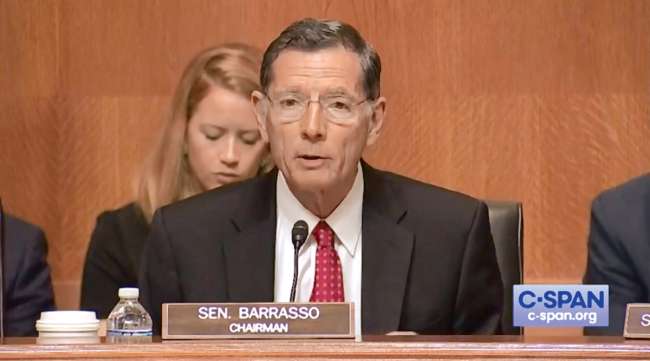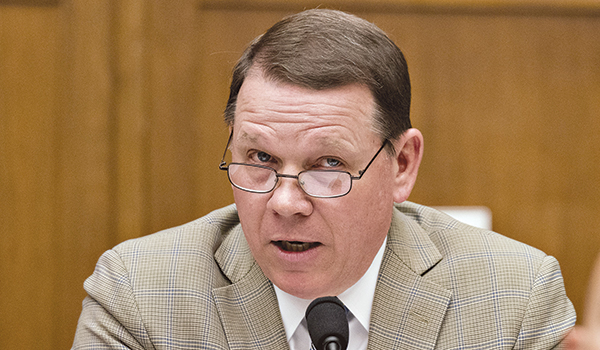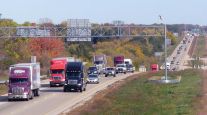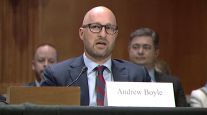Senior Reporter
Senators Tout VMT Absent Fix for Highway Trust Fund

[Stay on top of transportation news: Get TTNews in your inbox.]
A $287 billion highway bill the Senate Environment and Public Works Committee easily advanced last month is notable for several big-picture proposals.
The five-year bill would enhance severe-weather resilience for infrastructure systems. It would further streamline the environmental permitting process through a “one federal decision” approach.
And, despite lacking jurisdiction over the country’s traditional source of funding for the surface transportation system — the Highway Trust Fund — the Senate panel tackled the infrastructure funding dilemma.
The bill proposes an examination of a nationwide vehicle-miles-traveled (VMT) fee that would fund highway construction and maintenance projects.
According to the bill, the transportation secretary would ensure that officials “test the design, acceptance, equity and implementation of user-based alternative revenue mechanisms, including among differing income groups and among rural and urban drivers.”
The truth is, not only is our Highway Trust Fund going broke — our way of paying for it is broken, too.
Sen. Tom Carper (D-Del.)
Additionally, the bill calls for conducting public education and outreach programs to “increase public awareness regarding the need for road usage fees or other user-based alternative revenue mechanisms for surface transportation programs.” The provision also would emphasize privacy protections.
If a nationwide VMT system is adopted, agencies likely would keep track of the drivers’ miles through onboard devices, cellphones or self-reporting.
“Infrastructure is critical to our country, and we should responsibly pay for this legislation,” EPW committee Chairman John Barrasso (R-Wyo.) said last month.
Sen. Tom Carper of Delaware, the committee’s top Democrat, touted the VMT provision in the bill and referred to the trust fund’s looming insolvency as the “greatest challenge” for policymakers. “The truth is, not only is our Highway Trust Fund going broke — our way of paying for it is broken, too,” he said.
The VMT model has steadily gained support over the years. Although the House has yet to take up its version of the bill to update a highway law that expires in 2020, a VMT fee is likely to find a supporter in Rep. Sam Graves (R-Mo.).

Rep. Sam Graves (R-Mo.) has voiced support for a VMT fee before. (Andrew Harrer/Bloomberg News)
“A VMT [fee] has the potential to be a true user-funded program that captures everyone and gets the Highway Trust Fund back to where it needs to be to maintain our network and improve it,” Graves said earlier this year. “However, like any real solution, there are challenges. For instance, privacy is a big concern, and questions about whether or not VMT is fair to both rural and urban drivers have been raised.”
President Donald Trump has not addressed infrastructure funding recently, but his economic advisers pointed to the VMT system as an innovative approach to pay for improvements.
Former U.S. Deputy Secretary of Transportation John Porcari also touted VMTs.
At an event hosted by Brookings this summer, Porcari said, “I think there’s a very good chance that you’ll see pay by the mile, essentially, as something that the states adopt that becomes national policy and is therefore politically palatable to Congress because of that.”
Notwithstanding the EPW panel’s focus on VMTs, congressional committees with jurisdiction over the Highway Trust Fund have not announced legislative hearings aimed at resolving the fund’s threatening insolvency. The fund is backed by dwindling revenue from the gas and diesel tax, and it is used to assist states with transportation projects. With the expiration of the FAST Act highway law in the fall of 2020, analysts estimate the fund will require supplemental funding in a couple of years to stay operational. Insufficient revenue from the 24.4-cents-per-gallon diesel tax and 18.4-cents-per-gallon gas tax backs the account.
While infrastructure funding proponents, such as the U.S. Chamber of Commerce, have called on Congress to raise fuel taxes to boost the account, policymakers have avoided raising such taxes since 1993. Congress has instead considered alternatives, such as certain fees on electric cars or high-efficiency vehicles, as well as efforts to relax tolling restrictions.





